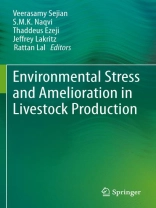Given the importance of livestock to the global economy, there is a substantial need for world-class reference material on the sustainable management of livestock in diverse eco-regions. With uncertain climates involving unpredictable extreme events (e.g., heat, drought, infectious disease), environmental stresses are becoming the most crucial factors affecting livestock productivity. By systematically and comprehensively addressing all aspects of environmental stresses and livestock productivity, this volume is a useful tool for understanding the various intricacies of stress physiology. With information and case studies collected and analyzed by professionals working in diversified ecological zones, this book explores the influence of the environment on livestock production across global biomes. The challenges the livestock industry faces in maintaining the delicate balance between animal welfare and production are also highlighted.
表中的内容
Introduction.- Factors influencing livestock productivity.- Heat stress impact on livestock production.- Walking stress influence on livestock production.- Environmental stresses and livestock reproduction.- Concept of multiple stresses and its significance on livestock productivity.- Ameliorative measures to counteract environmental stresses.- Nutritional manipulations to optimize productivity during environmental stresses in livestock.- Role of pineal gland in relieving environmental stress.- Basic principles involved in adaption of livestock to climate change.- Neuroendocrine regulations of adaptive mechanisms in livestock.- Molecular mechanisms of livestock adaptation.- Genetic adaptability of livestock to environmental stresses.- Genes involved in the thermal tolerance of livestock.- Impact of climate change on livestock production.- Global climate changes: Enteric methane reduction strategies in livestock.- Conclusions and Researchable Priorities.












